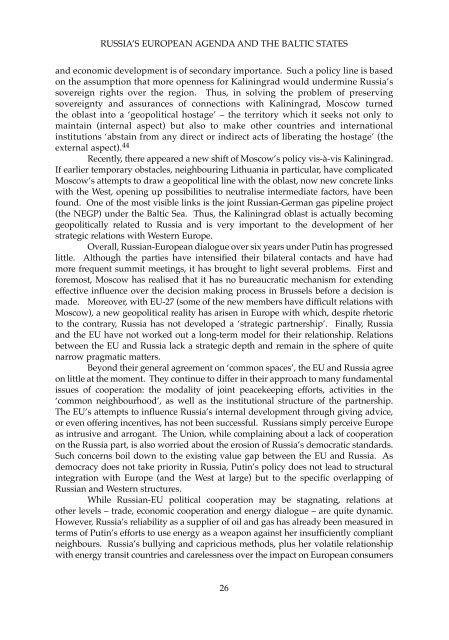Russia's European Agenda and The Baltic States - Defence ...
Russia's European Agenda and The Baltic States - Defence ...
Russia's European Agenda and The Baltic States - Defence ...
Create successful ePaper yourself
Turn your PDF publications into a flip-book with our unique Google optimized e-Paper software.
RUSSIA’S EUROPEAN AGENDA AND THE BALTIC STATES<br />
<strong>and</strong> economic development is of secondary importance. Such a policy line is based<br />
on the assumption that more openness for Kaliningrad would undermine Russia’s<br />
sovereign rights over the region. Thus, in solving the problem of preserving<br />
sovereignty <strong>and</strong> assurances of connections with Kaliningrad, Moscow turned<br />
the oblast into a ‘geopolitical hostage’ – the territory which it seeks not only to<br />
maintain (internal aspect) but also to make other countries <strong>and</strong> international<br />
institutions ‘abstain from any direct or indirect acts of liberating the hostage’ (the<br />
external aspect). 44<br />
Recently, there appeared a new shift of Moscow’s policy vis-à-vis Kaliningrad.<br />
If earlier temporary obstacles, neighbouring Lithuania in particular, have complicated<br />
Moscow’s attempts to draw a geopolitical line with the oblast, now new concrete links<br />
with the West, opening up possibilities to neutralise intermediate factors, have been<br />
found. One of the most visible links is the joint Russian-German gas pipeline project<br />
(the NEGP) under the <strong>Baltic</strong> Sea. Thus, the Kaliningrad oblast is actually becoming<br />
geopolitically related to Russia <strong>and</strong> is very important to the development of her<br />
strategic relations with Western Europe.<br />
Overall, Russian-<strong>European</strong> dialogue over six years under Putin has progressed<br />
little. Although the parties have intensified their bilateral contacts <strong>and</strong> have had<br />
more frequent summit meetings, it has brought to light several problems. First <strong>and</strong><br />
foremost, Moscow has realised that it has no bureaucratic mechanism for extending<br />
effective influence over the decision making process in Brussels before a decision is<br />
made. Moreover, with EU-27 (some of the new members have difficult relations with<br />
Moscow), a new geopolitical reality has arisen in Europe with which, despite rhetoric<br />
to the contrary, Russia has not developed a ‘strategic partnership’. Finally, Russia<br />
<strong>and</strong> the EU have not worked out a long-term model for their relationship. Relations<br />
between the EU <strong>and</strong> Russia lack a strategic depth <strong>and</strong> remain in the sphere of quite<br />
narrow pragmatic matters.<br />
Beyond their general agreement on ‘common spaces’, the EU <strong>and</strong> Russia agree<br />
on little at the moment. <strong>The</strong>y continue to differ in their approach to many fundamental<br />
issues of cooperation: the modality of joint peacekeeping efforts, activities in the<br />
‘common neighbourhood’, as well as the institutional structure of the partnership.<br />
<strong>The</strong> EU’s attempts to influence Russia’s internal development through giving advice,<br />
or even offering incentives, has not been successful. Russians simply perceive Europe<br />
as intrusive <strong>and</strong> arrogant. <strong>The</strong> Union, while complaining about a lack of cooperation<br />
on the Russia part, is also worried about the erosion of Russia’s democratic st<strong>and</strong>ards.<br />
Such concerns boil down to the existing value gap between the EU <strong>and</strong> Russia. As<br />
democracy does not take priority in Russia, Putin’s policy does not lead to structural<br />
integration with Europe (<strong>and</strong> the West at large) but to the specific overlapping of<br />
Russian <strong>and</strong> Western structures.<br />
While Russian-EU political cooperation may be stagnating, relations at<br />
other levels – trade, economic cooperation <strong>and</strong> energy dialogue – are quite dynamic.<br />
However, Russia’s reliability as a supplier of oil <strong>and</strong> gas has already been measured in<br />
terms of Putin’s efforts to use energy as a weapon against her insufficiently compliant<br />
neighbours. Russia’s bullying <strong>and</strong> capricious methods, plus her volatile relationship<br />
with energy transit countries <strong>and</strong> carelessness over the impact on <strong>European</strong> consumers<br />
26

















